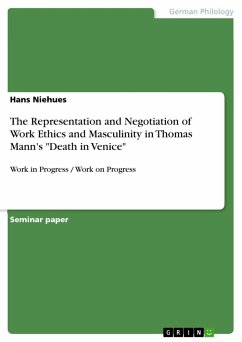Seminar paper from the year 2016 in the subject German Studies - Modern German Literature, grade: 1,0, University of South Carolina (Department of Languages Literatures and Cultures, German Program), course: CPLT700: Introduction to Graduate Studies in Languages, Literatures, and Cultures, language: English, abstract: Thomas Mann's novella Death in Venice, which was published in 1912, is regarded as one of the most influential works of German literature in the twentieth century. Literary scholars from all over the world have studied the book from different approaches. One strand of literary criticism that flourished over the last decades and gained prominence in the discourse on Death in Venice is the field of masculinity studies. Scholars like Michael Kimmel, Eve Kosofsky Sedgwick and R. W. Connell had a significant influence on the theorization of masculinity studies and its practical application over the last years. Drawing upon their findings, contemporary literary critics like Esther K. Bauer (2015), Karsten Essen (2007) and Daniel Marshall (2015) analyzed Death in Venice and shed light on the novella's representation and negotiation of masculinity. In their applications of masculinity studies to Thomas Mann's renowned work these scholars either give a general overview on the composition of masculine gender roles in the novella or focus on specific parameters of masculinity, in particular the aspect of homosexuality.
Bitte wählen Sie Ihr Anliegen aus.
Rechnungen
Retourenschein anfordern
Bestellstatus
Storno








